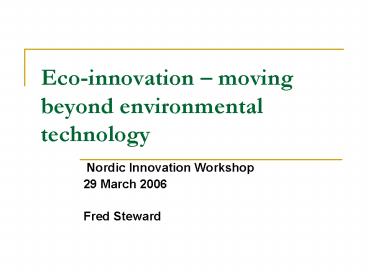Ecoinnovation moving beyond environmental technology - PowerPoint PPT Presentation
1 / 21
Title:
Ecoinnovation moving beyond environmental technology
Description:
Critical need for global sustainability to decouple economic growth from ... New focus on business and entrepreneurship capabilities for eco-innovation ... – PowerPoint PPT presentation
Number of Views:97
Avg rating:3.0/5.0
Title: Ecoinnovation moving beyond environmental technology
1
Eco-innovation moving beyond environmental
technology
- Nordic Innovation Workshop
- 29 March 2006
- Fred Steward
2
Director Prof Fred Steward 2002-2006 20
universities www.sustainabletechnologies.ac.uk
3
Programme Objective
- To identify explain the social and economic
forces that shape, foster or inhibit sustainable
technologies
4
Environmental Technology
- A relative not an absolute concept
- Innovation aimed at reducing
- energy consumption
- materials usage
- pollution
5
The specialness of eco-innovation
- DiscontinuityCrucial importance for global
competitiveness of disruptive, radical innovation - DecouplingCritical need for global
sustainability to decouple economic growth from
environmental degradation - Distributedness
- Systemic change in production consumption
6
From incremental to radical
- Incremental
- End-of-Pipe existing products processes -
add-ons and post-hoc modifications - Eco-Design design within existing
technological frame but attempt to balance
environmental impacts - Radical
- Clean Technology radical re-designing
re-thinking of solutions - New product-service systems
- Innovation in consumption production
7
(No Transcript)
8
(No Transcript)
9
Factors and actors
- Limits of traditional determinant factors
approach (context) - Need for more emphasis on strategic capabilities
(business actors themselves)
10
Factors influencing environmental innovation
11
Strategic choices
- Reactive
- response to regulation, customers,crisis,competiti
on - Anticipatory
- expected regulation
- Proactive
- move into new markets
- moral strategy
12
European Radical Ecoinnovators
Biodegradeable pyrethroid insecticides 20 of
global market
Wind turbines 36 global market
Aquabase water based paints Global leader
13
Business organisation - strategy competence
- Choice of ecosustainability as goal
- Anticipatory not reactive
- Differentiation rather than cost leadership
- Disruptive discontinuous losers as well as
winners - Relational capabilities coupling technology and
market
14
Challenge
- Innovation and entrepreneurship capabilities of
business organisations need to be developed and
oriented to ecoinnovation - Learning networks communities of practice need
serious new initiatives - Different network building strategies
15
Network types
- The knowledge/customer network type with strong
linkages into the research-base was commonest in
the UK set of cases - the regulator/supplier network type highlighting
linkages to the regulatory and public domain was
commonest in the German set of cases.
16
Opportunity compliance
- The knowledge/customer type of network prominent
among the UK cases was associated with an
opportunity led form of environmental
innovation. - The regulator/supplier type of network prominent
among the German cases was associated with a
compliance led form of environmental
innovation.
17
Knowledge/customer network
18
(No Transcript)
19
Supplier/Regulator network
20
(No Transcript)
21
Current European context
- Need to resolve conflict between competitiveness
(Lisbon) sustainability (Gothenburg) agendas - Investment in technology appropriate
regulations, important but not the whole story - New focus on business and entrepreneurship
capabilities for eco-innovation (Green papers on
innovation entrepreneurship)































